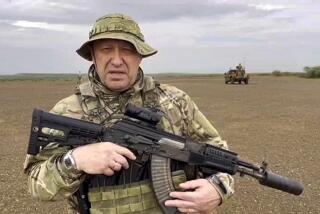KGB’s Legacy of Terror
- Share via
Since its inception in 1917, the Soviet secret police has played a key role in Soviet politics. Known over the years as Cheka, OGPU, NKVD, MGB and KGB, the agency is famous for its espionage abroad and its use of terror to suppress political dissidence at home . Here is a look at some of the more infamous KGB leaders: FELIX DZERZHINSKY, 1917-1926
Dzerzhinsky made a name for himself among Bolsheviks by leading a series of unsuccessful raids against the czars’ secret police force--the Okhrana. After the revolution, he persuaded Bolsheviks to create the “Extraordinary Commission to Combat Counterrevolution, Sabotage and Speculation”--the Cheka. Given unlimited powers by the Bolsheviks to arrest, imprison, torture and murder “enemies of the revolution,” Dzerzhinsky laid the agency’s foundations for future atrocities. He later became a candidate member of the Politburo and assisted Josef Stalin in his power struggle with Leon Trotsky. Dzerzhinsky died in 1926 of a heart attack. NIKOLAI YEZHOV, 1936-38
Picked by Stalin to curb the “excesses” of the purges led by his predecessor, Yezhov nevertheless carried out the bloodiest phase of the purges in which most of the nation’s top-ranking political and military leaders were killed, along with countless innocent civilians. During the worst period of terror in Soviet history, Yezhov was quoted as saying, “Better that 10 innocent people should suffer than one spy get away.” Yezhov is believed to have been shot on the orders of his successor. LAVRENTI BERIA, 1938-53
Beria continued the repression characterized by his predecessors--albeit on a smaller scale. He came to control a quarter-million troops, the militia, spy activities and labor camps. After Stalin’s death in 1953, Beria was arrested, charged with “criminal anti-party and anti-state activities” and shot by Politburo members who feared his immense power. YURI ANDROPOV, 1967-82
The only KGB head to rise to general secretary of the Communist Party, Andropov launched many reforms later continued by Mikhail S. Gorbachev. As ambassador to Hungary in 1956, Andropov proved himself a capable apparatchik by helping suppress the Hungarian revolution. One of his secretaries at the time was Vladimir A. Kryuchkov, the KGB chief fired for his role in the recent coup.
SOURCES: “The Soviet Union: Third Edition, Congressional Quarterly” and “KGB: The Inside Story.”
More to Read
Sign up for Essential California
The most important California stories and recommendations in your inbox every morning.
You may occasionally receive promotional content from the Los Angeles Times.










